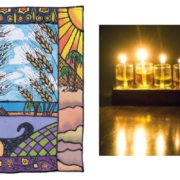Abundance and dreams, resilience and hope: Miketz and Chanukah

Pharaoh’s dreams (artist unknown); an oil-lamp chanukiyah.
This week we continue the Joseph story. In this installment, Pharaoh has two disturbing dreams. In one dream, seven happy fat cows emerge from the Nile, followed by seven emaciated cows who eat the fat ones. In the other, the same thing happens with ripe ears of corn and shrunken ones.
No one in his court can interpret the dreams. And then the cupbearer pipes up: I was in your prison a while back, and there was a Hebrew prisoner who interpreted dreams! So Pharaoh sends for Joseph, who says, the dreams mean that seven good years are coming, followed by seven years of famine.
Joseph tells Pharaoh to set someone wise in charge of his storehouses, someone who can save during the years of plenty so there will be food to eat in the lean times. Pharaoh promptly promotes him, saying, “Could we ever possibly find another man like him, a man in whom is the spirit of God?”
(Or in the words of Lin-Manuel Miranda, “Hey yo, I’m gonna need a right-hand man.”)
Pharaoh’s dreams are about guarding our resources. When there is abundance, set some aside and save it for when there won’t be. And this isn’t just about individual households saving what they can; Joseph sets aside grain for the whole nation, so the government can make sure everyone makes it through.
Every year, we read this at Chanukah. As my b-mitzvah students learned this week, there are different stories we can tell about Chanukah. One is the story of oppression and war in the books of Maccabees — which were not canonized into the Hebrew Bible, though they are part of some Christian Bibles.
Another is the story of the sanctified oil that lasted for eight days. That narrative comes to us from Talmud, and it’s the one our tradition chose to enshrine. That Chanukah story is a story about hope, and enough-ness, and the leap into faith when we don’t feel like we have enough fuel to keep hope burning.
Sometimes we feel like we don’t have enough. Maybe we feel that we ourselves aren’t enough. Maybe life feels overwhelming, and in the words of the poet William Stafford, “The darkness around us is deep.” The Chanukah story asks us to kindle light exactly then. That’s when we need hope most.
This week Torah says: don’t use everything up — resources are finite! Save some of what you have so you can help everyone make it through the lean times! Meanwhile the Chanukah story says: kindle the eternal light, even if you’re going to run out of oil! So which one is right? They both are.
The Torah teaching is about things we can touch: protecting our natural resources, not eating all the grain, making sure we can feed people when there’s famine. The Chanukah teaching is metaphysical: it’s not about oil, but about hope. It’s about kindling hope in our hearts, and keeping hope burning.
Earth and water and air and trees and food are finite, and we need to steward them carefully and share them equitably — that’s a big one, we’re working on that. But hope provides its own fuel. And like love, it doesn’t diminish when we share it. Being a Jew — for me — means living up to both of these truths.
We need to be wise with our resources, and help people who live at sea level, and nations that don’t yet have enough vaccines. That’s never been more true than it is now. And we need to keep hope kindled in our hearts, even when the world seems hopeless, especially when the world seems hopeless.
The Hasidic master Reb Nachman (b. 1772) struggled with depression. And yet he taught that despair is a sin. Because despair means the complete absence of hope. And that means we’ve given up on each other, and on ourselves, and on God. And if we’ve given up, we won’t work to repair what’s broken.
That’s another thing it means to me to be a Jew: tikkun olam, repairing our broken world. We are God’s hands in the world. It’s aleinu, it’s on us, to build a world of greater justice and love and hope — and not to give up.
This is the d’varling Rabbi Rachel offered at CBI on Shabbat Chanukah (cross-posted to Velveteen Rabbi.)






